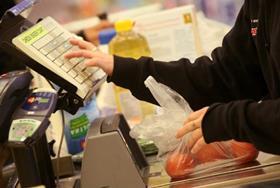
Food prices bucked retailer deflation trends in April due to high global commodity prices according to the British Retail Consortium.
Their monthly Nielsen Price Index revealed an overall drop in retail prices by 2.2 per cent in April, marking 5 years of deflation in the sector.
The cost of fresh produce rose by 0.9 per cent, with food in general up 1 per cent. Helen Dickinson OBE, chief executive of the British Retail Consortium, urged the food industry to tackle the threat of post-Brexit customs delays to prevent further food price rises.
“Overall, shop prices continued to fall in April, representing the deepest period of deflation since February last year,” Dickinson said.
“Higher global commodity prices than last year pushed food price inflation upwards in April. On the other hand, non-food prices sunk further into deflation as retailers continue to respond to the squeeze on households’ discretionary spending by offering low and falling prices.
'As negotiations on Brexit continue to play out against this backdrop the importance of addressing the issue of frictionless movement of goods across borders is increasing. Retailers must have clarity on this position if they are to continue to provide a wide range of goods for consumers at affordable prices.'
Mike Watkins, head of retailer and business insight at Nielsen, added: 'With weak consumer demand, any success in sales performance is coming at the expense of retailer’s margins, with lower prices in non food, and inflation now hovering around 1% in food stores.
“Recent industry data suggests poor footfall and with unseasonably cool weather punctuated by a brief hot spell, sales momentum has been hard to sustain. So whilst promotional activity continued after Easter, retailers are still keeping prices competitive to tempt shoppers back into store as consumers not yet feeling better off.'



